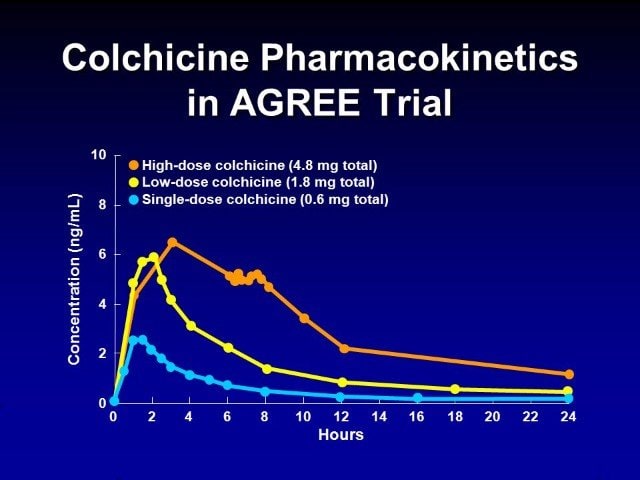La colchicine pour les crises de goutte
La colchicine est un médicament sur ordonnance (Nom de marque : Colcrys) qui traite la goutte extraite de plantes du genre Colchicum,une plante très toxique sans antidote connu et connue pour sa toxicité. Elle est utilisée depuis environ 2000 ans comme traitement efficace de la goutte, et son utilisation moderne sous forme de comprimés a commencé en 1936. Benjamin Franklin souffrait de la goutte et est connu pour avoir apporté des plantes de Colchicum d'Europe. Colchicum, plantes d'Europe.
Comment fonctionne la colchicine ?
La colchicine ne baisse pas les niveaux d'acide urique, mais elle agit pour bloquer l'inflammation causée par les cristaux d'acide urique, soulageant ainsi la douleur, avec un effet rapide généralement dans les 12 à 24 heures, en ralentissant l'inflammation. Chaque fois que j'ai une crise de goutte, c'est mon médicament de choix. Je me précipite chez le médecin pour obtenir une ordonnance et je prends environ 3 à 4 comprimés par jour pendant les 2 premiers jours, puis environ 2 par jour pendant encore 2 jours après cela.
C'est le médicament miracle à action rapide pour nous, les personnes atteintes de la goutte, c'est certain ! Apparemment, cela ne fonctionne pas pour tout le monde, mais il a un taux de réussite élevé dans la réduction de la douleur, d'environ 75 %, et la colchicine doit être prise dans les 12 heures suivant une crise pour être la plus efficace. Assurez-vous de boire de 12 à 15 verres de 8 oz d'eau par jour lorsque vous prenez de la colchicine, car cela permet au médicament de fonctionner plus efficacement. La colchicine est généralement prise en combinaison avec d'autres médicaments contre la goutte pour aider à gérer les symptômes.
Il est important de prendre la colchicine avec la bonne posologie, car des cas de surdosage ayant entraîné la mort ont été rapportés. La posologie recommandée par la FDA est de prendre 1,2 mg, suivis de 0,6 mg une heure plus tard, ce qui suffit pour une journée, totalisant 1,8 mg pendant une crise de goutte. Pour prévenir les crises de goutte, il est recommandé de prendre 0,6 mg une ou deux fois par jour pour les personnes de plus de 16 ans, avec une dose maximale de 1,2 mg par jour. Les rhumatologues déconseillent maintenant de prendre de la colchicine inutilement pour un traitement préventif à long terme contre la goutte, et vous devriez arrêter de la prendre après avoir pris 2 comprimés par jour pendant les premières semaines d'une thérapie visant à baisser les niveaux d'acide urique. Personnellement, j'arrête de la prendre une fois que la douleur à mon gros orteil diminue suffisamment pour que je puisse tolérer la douleur en marchant, ce qui prend généralement 4 à 5 jours.
Il est important d'être régulier dans la prise de colchicine selon les prescriptions de votre médecin. Oublier une dose ou ne pas la prendre selon l'horaire peut entraîner une diminution de l'efficacité du médicament, voire même son arrêt.
Si vous oubliez une dose, prenez-la immédiatement dès que vous vous en rendez compte. Si l'heure de prendre la prochaine dose de colchicine approche dans quelques heures seulement, vous pouvez simplement considérer la dose précédente et la prochaine dose comme une seule dose. Ne tentez pas de compenser la dose oubliée en prenant deux doses, car cela peut entraîner des effets secondaires graves.
Vous saurez que le médicament fonctionne lorsque vous ressentirez moins de douleur dans votre articulation affectée. Vous devriez également avoir moins de crises de goutte après avoir pris de la colchicine.
Quels sont les effets secondaires ?
Si vous souffrez de maladie rénale, de maladie du foie, de troubles de la moelle osseuse, de maladie inflammatoire de l'intestin ou d'un faible taux de globules blancs, vous ne devez pas prendre de colchicine et cela vaut généralement aussi pour les personnes âgées.
Les effets secondaires que j'ai personnellement ressentis sont généralement la diarrhée, aller aux toilettes toutes les quelques heures et les crampes d'estomac les jours où je prends 3-4 comprimés juste après une crise. D'autres effets secondaires comprennent les vomissements et les nausées. Il est très important de faire attention à comment la colchicine vous affecte personnellement et l'allopurinol est un meilleur médicament pour le traitement à long terme de la goutte.
De plus, l'allopurinol doit être introduit lentement après une crise de goutte, car au début, il peut également déclencher une crise de goutte. N'oubliez pas que la colchicine arrête une crise en cours tandis que l'allopurinol agit pour réduire les niveaux d'acide urique dans votre corps. La colchicine est destinée à une utilisation limitée tandis que l'allopurinol est destiné à une utilisation à long terme.
Il a été annoncé en janvier 2015 par Takeda Pharmaceuticals USA, le fabricant de la colchicine vendue sous le nom de Colcrys pour les crises aiguës de goutte, qu'une version générique sera bientôt disponible sur le marché, sans spécifier le nouveau prix. Actuellement, le Colcrys de marque se vend à environ 6 dollars par comprimé. Depuis son approbation par la FDA en 2009, il y a eu beaucoup de controverses, car les versions génériques ont été retirées du marché, créant ainsi un monopole sur le médicament et expliquant le coût élevé du comprimé. C'est une bonne nouvelle pour les personnes souffrant de la goutte qui pourront désormais se permettre d'acheter de la colchicine à un prix plus bas et plus abordable.
La colchicine est également disponible sous forme de capsule, tant en version générique que sous la marque Mitigare. Toutes les pharmacies ne vendent pas de colchicine, il est donc conseillé d'appeler à l'avance pour vérifier la disponibilité.
De plus, en février 2019, il a été annoncé que la FDA a approuvé la première solution buvable de colchicine pour le traitement des crises de goutte. Ainsi, les personnes âgées atteintes de goutte, qui représentent 15% des patients, et qui ont des difficultés à avaler les médicaments sous forme de capsule ou de comprimé, peuvent maintenant prendre la colchicine par voie orale.
Une étude en 2020 publiée dans Arthritis Research & Therapy a révélé que le traitement à la colchicine peut augmenter le risque de diarrhée et d'autres problèmes gastro-intestinaux, mais pas de problèmes hépatiques, musculaires, sensoriels, d'infections, hématologiques ou de décès, selon leurs résultats.
La colchicine peut également entraîner une réduction des cellules sanguines dans le corps, ce qui peut être risqué car certains types de cellules sanguines sont responsables de la lutte contre les infections et de la formation de caillots sanguins. Si vous avez un trouble sanguin, il peut être difficile de se débarrasser d'une infection ou de guérir une plaie.
Un autre effet secondaire de la colchicine est la rhabdomyolyse ou les lésions musculaires. Si elle est prise pendant 6 mois ou plus, elle peut endommager les muscles et les reins, surtout chez les personnes âgées. Si vous prenez déjà d'autres médicaments en même temps que la colchicine, cela peut augmenter les risques. Assurez-vous de parler à votre médecin afin qu'il puisse vous prescrire un schéma posologique plus sûr pour vous.
Interactions médicamenteuses
Outre la colchicine, il est important d'être prudent avec les médicaments que vous prenez en association avec elle. Certains médicaments peuvent interagir de manière négative avec la colchicine. Voici quelques exemples :
- Les médicaments contre le VIH, notamment l'atazanavir, l'indinavir, le saquinavir, le nelfinavir et le ritonavir.
- Les médicaments antifongiques tels que le kétoconazole et l'itraconazole.
- Les antibiotiques tels que la télithromycine et la clarithromycine.
- Les antidépresseurs tels que la néfazodone.
- Les médicaments antiarythmiques tels que la digoxine.
- Les médicaments contre le cholestérol tels que la fluvastatine, la pravastatine, la lovastatine, l'atorvastatine, les fibrates, la simvastatine et la gemfibrozile.
- Les médicaments cardiaques tels que la diltiazem et la vérapamil.
Ces médicaments, lorsqu'ils sont pris en même temps que la colchicine, augmentent les niveaux de colchicine dans votre corps, ce qui peut entraîner des lésions musculaires. Certains d'entre eux, tels que les médicaments cardiaques, peuvent provoquer de la constipation, de la diarrhée, des nausées et des vomissements.
Si vous prenez actuellement l'un des médicaments mentionnés ci-dessus, votre médecin réduira votre dosage de colchicine afin d'éviter ces effets secondaires.
Pour vous assurer que vous prenez la bonne quantité de colchicine, votre médecin peut vérifier votre numération sanguine ainsi que votre fonction hépatique et musculaire. Ce sont les parties de votre corps les plus affectées par une surdose de colchicine, donc si elles ne fonctionnent pas correctement, votre dosage doit être réduit.
Interactions alimentaires
Il y a un fruit spécifique à éviter lorsque vous prenez de la colchicine, et c'est le pamplemousse. En effet, le pamplemousse rend le processus de traitement de la colchicine par le corps moins efficace. Évitez de consommer du pamplemousse ou de son jus lorsque vous prenez ce médicament.
En conclusion, un nouveau médicament contre la goutte appelé Arcalyst est en développement et il semble avoir moins d'effets secondaires que la colchicine, tout en offrant le même rôle que la colchicine pour soulager les symptômes de la goutte. Assurez-vous également de parler à votre médecin de tout autre médicament que vous pourriez prendre et qui pourrait interagir négativement avec la colchicine et causer des problèmes de santé. J'aimerais connaître vos expériences avec la colchicine, si vous voulez bien les partager.

